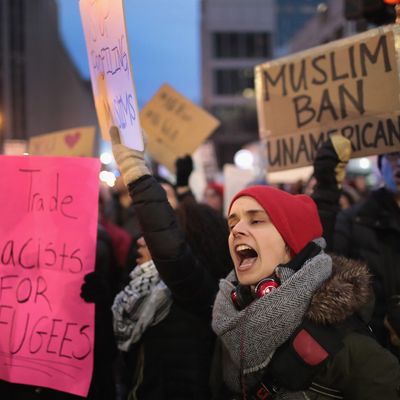
It was signed in private and announced to the world on Fox & Friends by Kellyanne Conway, an indication that the White House wants its revised travel ban to make less news than the flawed original, while reassuring “the base” that he hasn’t relented on the underlying policy.
The new ban, as expected, “cures” a lot of the problems that led to its suspension by the federal courts (most definitively by Judge James Robart, with an assist from the Ninth Circuit Court of Appeals). It explicitly does not apply to legal permanent residents, which the White House tried to exempt the day after the original order. It is limited in scope to future visa applications (or renewals), which helps avoid more chaos at airports, as does its more deliberate timetable for implementation (taking effect on March 16, not immediately). An indefinite ban on refugees from Syria now has an end date, one of a number of steps made to buttress the frayed national-security rationale for the ban. And perhaps most significantly from a legal standpoint, there is no longer a preference for Christian refugees, which removed one of the grounds for concluding this whole exercise is just a thinly veiled recasting of the clearly unconstitutional “Muslim ban” Trump originally promised on the campaign trail.
The exclusion of immigrants from Iraq from the new travel ban focuses on a political, not legal, problem with the original ban: embarrassing incidents of Iraqis who risked their lives for the American military being kept from seeking refuge in the U.S., and blowback from the Iraqi government, which is heavily engaged in joint operations against ISIS.
The new executive order generally supplies more language justifying various elements of the ban on national-security grounds, in part to counter the impression given by recent Department of Homeland Security reports that immigrants from the countries covered by the travel ban do not represent that distinctive or imminent a threat.
So at first blush the revised policy looks likely to survive an initial wave of lawsuits seeking to prevent its implementation. It does, for example, revoke the “old” order, despite some concerns that the president would never concede his black-robed critics were right. But looking ahead, there is very little the administration can do to completely prevent judicial consideration of the many statements made by Trump and his surrogates during the campaign that a “Muslim ban” was their ultimate goal. And that could be where the incurable problem lies.
Watch Secretary of State Rex Tillerson, Attorney General Jeff Sessions and Department of Homeland Security Secretary John Kelly announce the updated travel ban in the video below.






























